Grand Hotel Blu-ray Movie
HomeGrand Hotel Blu-ray Movie 
Warner Bros. | 1932 | 112 min | Not rated | Jan 08, 2013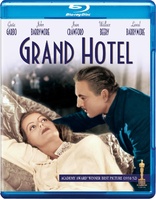
Movie rating
7.4 | / 10 |
Blu-ray rating
| Users | 0.0 | |
| Reviewer | 3.5 | |
| Overall | 3.5 |
Overview
Grand Hotel (1932)
Several different dramas unfold in a luxury hotel in 1930s Berlin. Ruined aristocrat John Barrymore. Terminally ill clerk Lionel Barrymore. Ruthless tycoon Wallace Beery. Scheming stenographer Joan Crawford. Disillusioned ballerina Greta Garbo, who mutters the immortal line, "I want to be alone." Luckily she isn't, as the lives of the Grand Hotel's patrons intersect and weave a wonderfully entertaining web of drama.
Starring: Greta Garbo, John Barrymore, Joan Crawford, Wallace Beery, Lionel BarrymoreDirector: Edmund Goulding
| Drama | 100% |
| Romance | 80% |
Specifications
Video
Video codec: MPEG-4 AVC
Video resolution: 1080p
Aspect ratio: 1.37:1
Original aspect ratio: 1.37:1
Audio
English: DTS-HD Master Audio Mono (48kHz, 24-bit)
French: Dolby Digital Mono
German: Dolby Digital Mono
Italian: Dolby Digital Mono
Spanish: Dolby Digital Mono
Spanish: Dolby Digital Mono (Spain)
Subtitles
English SDH, French, German SDH, Italian SDH, Japanese, Spanish, Korean
Discs
25GB Blu-ray Disc
Single disc (1 BD)
Playback
Region free
Review
Rating summary
| Movie | 4.0 | |
| Video | 4.0 | |
| Audio | 2.5 | |
| Extras | 3.5 | |
| Overall | 3.5 |
Grand Hotel Blu-ray Movie Review
Nothing Ever Happens at the Original MGM Grand
Reviewed by Michael Reuben January 14, 2013Oscar's best picture of 1932 was the brainchild of wunderkind producer Irving Thalberg, and it broke the mold of studio pictures before it. Conventional wisdom of the time required that each film be allotted only one star, but Thalberg, whom no one ever accused of thinking small, decided that MGM had so many stars under contract that it could afford to lavish a whole group on one big show. Of course, each star had to have a story, and thus was born a multi-layered extravaganza whose progeny includes such diverse products as the Seventies disaster films with their megawatt casts, Robert Altman's "who'll show up next?" projects like Nashville and Short Cuts with their overlapping narratives, Neil Simon's various Suite comedies (Plaza, California and London) and, God help us, Gary Marshall's holiday-themed smorgasbords. Grand Hotel also illustrates Hollywood's early adoption of a practice that's still familiar, which is the perpetual recycling of material. The film began as a German novel by Vicki Baum, who based the story on her experiences working as a hotel chambermaid. When Thalberg purchased the rights, he first had it adapted into a Broadway play, which made a profit. Only then did Thalberg set about having Grand Hotel adapted to the screen, under the supervision of director Edmund Goulding (Dark Victory). The story would later be remade again as a movie (in the 1945 film Week-End at the Waldorf), for Broadway (in the 1989 musical Grand Hotel) and, in its latest incarnation, as a Las Vegas gambling attraction (the MGM Grand). Of the many starry presences in the film, the brightest by far at the time was the legendary Greta Garbo, whose despairing ballerina speaks the line in Grand Hotel with which Garbo herself would forever after be identified: "I want to be alone." Garbo always insisted that the character wasn't her, and that she merely wanted to be left alone by the press and public, but her performance was so convincing and, opposite the great John Barrymore, so compelling that the identification with her character was probably unavoidable.
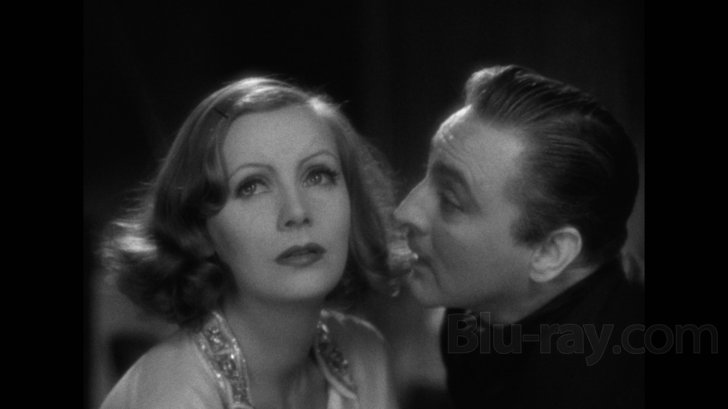
The film is set entirely within the most luxurious hotel in Berlin. Art director Cedric Gibbons studied the cream of European resorts, then designed one even more sumptuous for the camera. A series of carefully choreographed crane shots establish the scale of the operation, as well as its constant activity: switchboard operators routing calls, staff at a busy concierge desk answering questions and receiving new arrivals, other staff tending to all manner of requests as patrons come and go throughout the lobby. A porter named Senf (Jean Hersholt) is on the phone with a hospital inquiring after his wife, who is in labor. His frustration over the lack of news is a subplot running through the film. The remaining subplots all concern guests at the hotel. We are introduced to many of them through an initial series of telephone conversations occurring simultaneously in booths in the hotel lobby. The same element of chance allows these stories to brush up against each other—and sometimes collide—throughout Grand Hotel. The guest most likely to turn up in any story is Baron Felix von Geigern (John Barrymore), a nobleman fallen on hard times, who is there to perpetrate a robbery to satisfy a debt. But his eye is caught by a pretty young typist, who goes by the name of "Flaemmchen" (Joan Crawford, who feared, not without reason, that her scenes would be cut by local censors). Flaemmchen has been hired by one Preysing (Wallace Beery), the head of a large industrial concern, who has come to Berlin to conclude a merger that he desperately needs. A brutish, lecherous bully, Preysing is the film's villain. Beery, who was then at the height of his popularity, had to be talked into taking the role and reportedly complained throughout the making of the film. Despite the pressures of business, Preysing has time to make a crassly commercial proposition to Flaemmchen. For her part, she seems more than willing to accept it, despite her obvious interest in the Baron. Indeed, she almost seems to invite Preysing's offer. As luck would have it, one of Preysing's long-suffering employees is also a guest. A bookkeeper named Otto Kringelein (Lionel Barrymore, John's brother) has been told that he hasn't long to live and has decided to blow all his money on one last good time. Initially a pitiful figure, he will make friends with the Baron and Flaemmchen and discover an unexpected joy in human connection—and also in gambling, drinking and dancing. Lionel Barrymore's performance is bold and theatrical, but especially in his scenes with his brother as the Baron, unusually affecting. It's impossible to recognize either the face or the voice of the actor who, fourteen years later, would play the evil Mr. Potter in It's a Wonderful Life. The famous Russian dancer, Grusinskaya (Garbo), is also a guest, but she is reclusive, appearing just long enough to enter and exit the limousine that takes her to and from the theater. Grusinskaya is exhausted and despairing, though exactly why is never fully explained (and it's a tribute to Garbo's screen presence that no explanation is needed). As a result of unexpected developments, however, Grusinskaya glimpses the possibility of a new beginning and she departs the hotel at the end of the film filled with hope. But is it an illusion? Floating through these proceedings like some specter out of Edgar Allan Poe is Dr. Otternschlag (Lewis Stone), a military physician whose face has been badly scarred by injury and disease. He occasionally checks the front desk for messages, of which there are none. It is the doctor who bookends the film with the strange pronouncement: "Grand Hotel... always the same. People come, people go. Nothing ever happens." On the contrary, quite a lot happens in the two hours between the doctor's pronouncements, but perhaps it doesn't amount to much from the sepulchral perspective of a walking death's head.
Grand Hotel Blu-ray Movie, Video Quality 
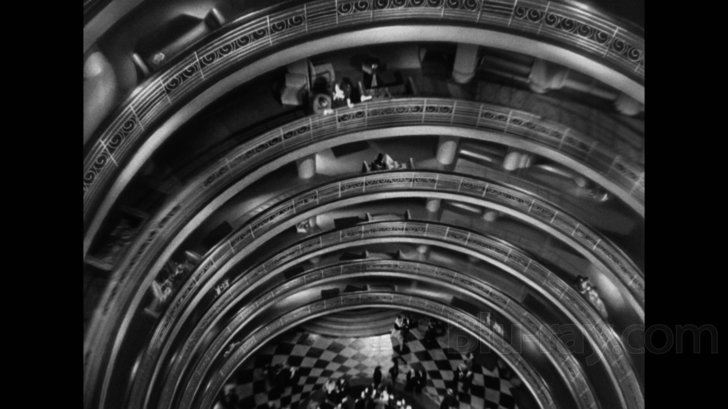
Like nearly all of Garbo's films, Grand Hotel was shot by William H. Daniels, who was often credited with creating the famous Garbo "face" but always insisted otherwise. (Ironically, Daniels' only Oscar win was for a non-Garbo film, 1948's The Naked City.) Widely considered one of the great innovators in lighting for black-and-white, Daniels devised numerous tricks to adapt to the quirks of the various stars in Grand Hotel and also to the scale of the vast set. Modern audiences aren't likely to have an opportunity to see Daniels' work projected on a thirty-foot-tall screen as he intended, but Warner's 1080p, AVC-encoded Blu-ray is the next best thing. The source is clean, the blacks are solid and deep, and the shades of gray are finely differentiated. According to the scholarly commentary track, much of Grand Hotel was shot with some degree of diffusion, in part to flatter the features of star John Barrymore (and disguise his hangovers), and in part to contribute to a sense of spaciousness and old world grandeur. This provides a somewhat softer image. To make matters more challenging, the film's original camera negative was lost, and all of the surviving elements are reportedly several generations removed from the OCN. The result is a somewhat inconsistent level of detail, but it's not something you're likely to notice unless you're looking for it. What is noticeable is the pleasingly natural grain pattern that has been accurately reproduced without reduction or filtering. Whatever detail remains on the existing elements appears to have been fully translated to Blu-ray. No doubt due to the fact that all of the extras are in standard definition, Warner's use of a BD-25 does not appear to have provided any challenge for the compressionist. No artifacts were in evidence.
Grand Hotel Blu-ray Movie, Audio Quality 
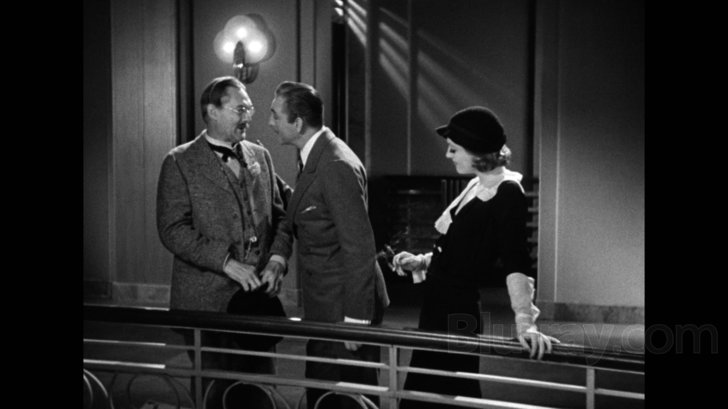
Grand Hotel's mono audio track, presented in lossless DTS-HD MA 1.0, shows its age, with noticeable background hiss and a thin top end to the orchestral accompaniment that makes it inadvisable to listen at anything more than a modest volume. But this is a not a film that requires "reference level" for its dialogue to be intelligible. The spoken exchanges are clear at all times, and the underscoring, most of it drawn from Strauss, Grieg and Rachmaninoff and heard as if the Grand Hotel's ballroom orchestra were permanently playing in the background, does not need to be loud to create the desired effect.
Grand Hotel Blu-ray Movie, Special Features and Extras 
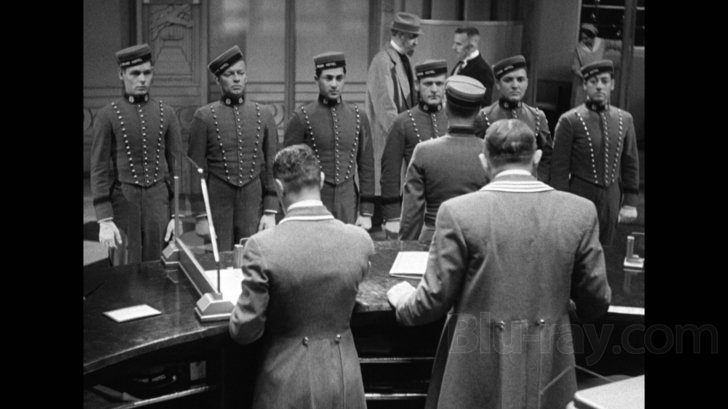
The Blu-ray includes the supplements from the 2004 and 2008 DVDs. New to the Blu-ray is an informative commentary track.
- Commentary with Jeffrey Vance and Mark A. Vieira: Vance is a film historian and former archivist for MGM, where Grand Hotel was produced. Vieira is a writer, photographer and historian whose books include a biography of Irving Thalberg. Their track is a gold mine of information on the making of the film, its stars, director, producer and the various craftspeople involved. The commentary includes information about reshoots, edits, an alternate opening, script changes and similar details that would today be preserved during the making of a film for inclusion on a DVD or Blu-ray, but for a film of Grand Hotel's vintage must be painstakingly researched in studio archives.
- Checking Out: Grand Hotel (480i; 1.33:1; 12:20): All of the information in this "making of" documentary is also included in the commentary, but here it's less densely relayed and accompanied by helpful visuals.
- Hollywood Premiere of Metro Goldwyn Mayer's Grand Hotel (480i; 1.33:1; 9:24): Newsreel footage from the film's opening at Graumann's Chinese Theatre. They don't do premieres like this anymore.
- Nothing Ever Happens (480i; 1.33:1; 18:50): A musical parody of Grand Hotel released in 1933.
- Just a Word of Warning Theater Announcement (480i; 1.33:1; 1:16): Catch it now, or you'll miss your chance!
- Trailers
- Grand Hotel (1932) (480i; 1.33:1; 2:27)
- Week-End at the Waldorf (1945) (480i; 1.33:1; 2:42)
Grand Hotel Blu-ray Movie, Overall Score and Recommendation 
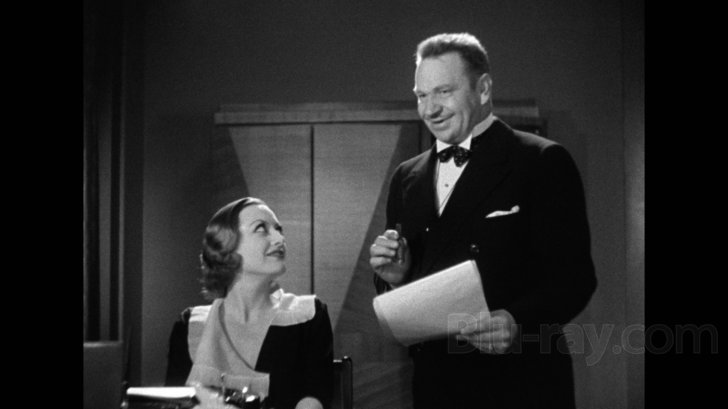
When one takes a step back from the lavish decor and costumes, what's most striking about the guests of Grand Hotel is that they're all in trouble, spiritually, physically or financially. There isn't one among them for whom anyone would confidently forecast a bright future. Thalberg's instincts for what the audience wanted were legendary. In 1932, the year that FDR was first elected to the White House, the effects of the Depression were being felt everywhere. While audiences might have been willing to enjoy the escapism of seeing opulence on the screen, perhaps Thalberg sensed that they didn't want to see characters enjoying that opulence without penalty. As Grand Hotel ends, a young couple arrives, probably newlyweds. They're all smiles and anticipation. One wonders how they'll be after their stay. Highly recommended.
Similar titles
Similar titles you might also like

Mrs. Miniver
1942

Mutiny on the Bounty
1935

A Streetcar Named Desire
Warner Archive Collection
1951

Cavalcade
80th Anniversary / Fox Studio Classics
1933

The Life and Death of Colonel Blimp
1943

Gigi
1958

Wings
1927

An American in Paris
1951

Wild River
Fox Studio Classics
1960

Coco Chanel & Igor Stravinsky
2009

The Artist
2011

Shampoo
1975

Casablanca 4K
80th Anniversary Edition
1942

The Cincinnati Kid
1965

Kept Husbands
1931

The Woman Between
1931

Cleopatra
1934

Cabaret
Reissue
1972

Vanity Fair
2004

Havana
1990